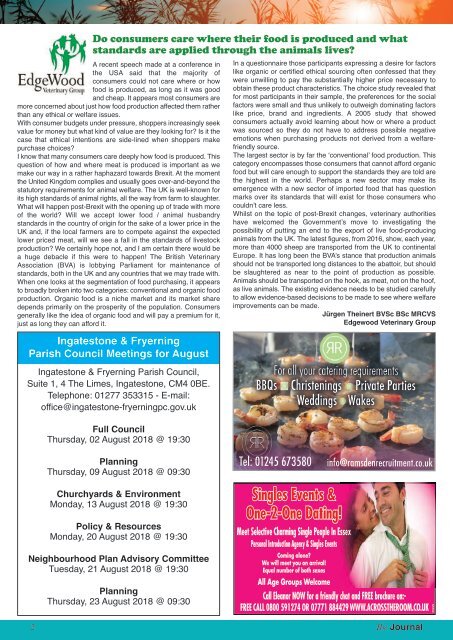IngAUG
You also want an ePaper? Increase the reach of your titles
YUMPU automatically turns print PDFs into web optimized ePapers that Google loves.
Do consumers care where their food is produced and what<br />
standards are applied through the animals lives?<br />
A recent speech made at a conference in<br />
the USA said that the majority of<br />
consumers could not care where or how<br />
food is produced, as long as it was good<br />
and cheap. It appears most consumers are<br />
more concerned about just how food production affected them rather<br />
than any ethical or welfare issues.<br />
With consumer budgets under pressure, shoppers increasingly seek<br />
value for money but what kind of value are they looking for? Is it the<br />
case that ethical intentions are side-lined when shoppers make<br />
purchase choices?<br />
I know that many consumers care deeply how food is produced. This<br />
question of how and where meat is produced is important as we<br />
make our way in a rather haphazard towards Brexit. At the moment<br />
the United Kingdom complies and usually goes over-and-beyond the<br />
statutory requirements for animal welfare. The UK is well-known for<br />
its high standards of animal rights, all the way from farm to slaughter.<br />
What will happen post-Brexit with the opening up of trade with more<br />
of the world? Will we accept lower food / animal husbandry<br />
standards in the country of origin for the sake of a lower price in the<br />
UK and, if the local farmers are to compete against the expected<br />
lower priced meat, will we see a fall in the standards of livestock<br />
production? We certainly hope not, and I am certain there would be<br />
a huge debacle if this were to happen! The British Veterinary<br />
Association (BVA) is lobbying Parliament for maintenance of<br />
standards, both in the UK and any countries that we may trade with.<br />
When one looks at the segmentation of food purchasing, it appears<br />
to broadly broken into two categories: conventional and organic food<br />
production. Organic food is a niche market and its market share<br />
depends primarily on the prosperity of the population. Consumers<br />
generally like the idea of organic food and will pay a premium for it,<br />
just as long they can afford it.<br />
Ingatestone & Fryerning<br />
Parish Council Meetings for August<br />
Ingatestone & Fryerning Parish Council,<br />
Suite 1, 4 The Limes, Ingatestone, CM4 0BE.<br />
Telephone: 01277 353315 - E-mail:<br />
office@ingatestone-fryerningpc.gov.uk<br />
Full Council<br />
Thursday, 02 August 2018 @ 19:30<br />
Planning<br />
Thursday, 09 August 2018 @ 09:30<br />
In a questionnaire those participants expressing a desire for factors<br />
like organic or certified ethical sourcing often confessed that they<br />
were unwilling to pay the substantially higher price necessary to<br />
obtain these product characteristics. The choice study revealed that<br />
for most participants in their sample, the preferences for the social<br />
factors were small and thus unlikely to outweigh dominating factors<br />
like price, brand and ingredients. A 2005 study that showed<br />
consumers actually avoid learning about how or where a product<br />
was sourced so they do not have to address possible negative<br />
emotions when purchasing products not derived from a welfarefriendly<br />
source.<br />
The largest sector is by far the ‘conventional’ food production. This<br />
category encompasses those consumers that cannot afford organic<br />
food but will care enough to support the standards they are told are<br />
the highest in the world. Perhaps a new sector may make its<br />
emergence with a new sector of imported food that has question<br />
marks over its standards that will exist for those consumers who<br />
couldn’t care less.<br />
Whilst on the topic of post-Brexit changes, veterinary authorities<br />
have welcomed the Government’s move to investigating the<br />
possibility of putting an end to the export of live food-producing<br />
animals from the UK. The latest figures, from 2016, show, each year,<br />
more than 4000 sheep are transported from the UK to continental<br />
Europe. It has long been the BVA’s stance that production animals<br />
should not be transported long distances to the abattoir, but should<br />
be slaughtered as near to the point of production as possible.<br />
Animals should be transported on the hook, as meat, not on the hoof,<br />
as live animals. The existing evidence needs to be studied carefully<br />
to allow evidence-based decisions to be made to see where welfare<br />
improvements can be made.<br />
Jürgen Theinert BVSc BSc MRCVS<br />
Edgewood Veterinary Group<br />
2<br />
Churchyards & Environment<br />
Monday, 13 August 2018 @ 19:30<br />
Policy & Resources<br />
Monday, 20 August 2018 @ 19:30<br />
Neighbourhood Plan Advisory Committee<br />
Tuesday, 21 August 2018 @ 19:30<br />
Planning<br />
Thursday, 23 August 2018 @ 09:30<br />
Singles Events &<br />
One-2-One Dating!<br />
Meet Selective Charming Single People In Essex<br />
Personal Introduction Agency & Singles Events<br />
Coming alone?<br />
We will meet you on arrival!<br />
Equal number of both sexes<br />
All Age Groups Welcome<br />
Call Eleanor NOW for a friendly chat and FREE brochure on:-<br />
FREE CALL 0800 591274 OR 07771 884429 WWW.ACROSSTHEROOM.CO.UK<br />
The Journal<br />
©LW


















